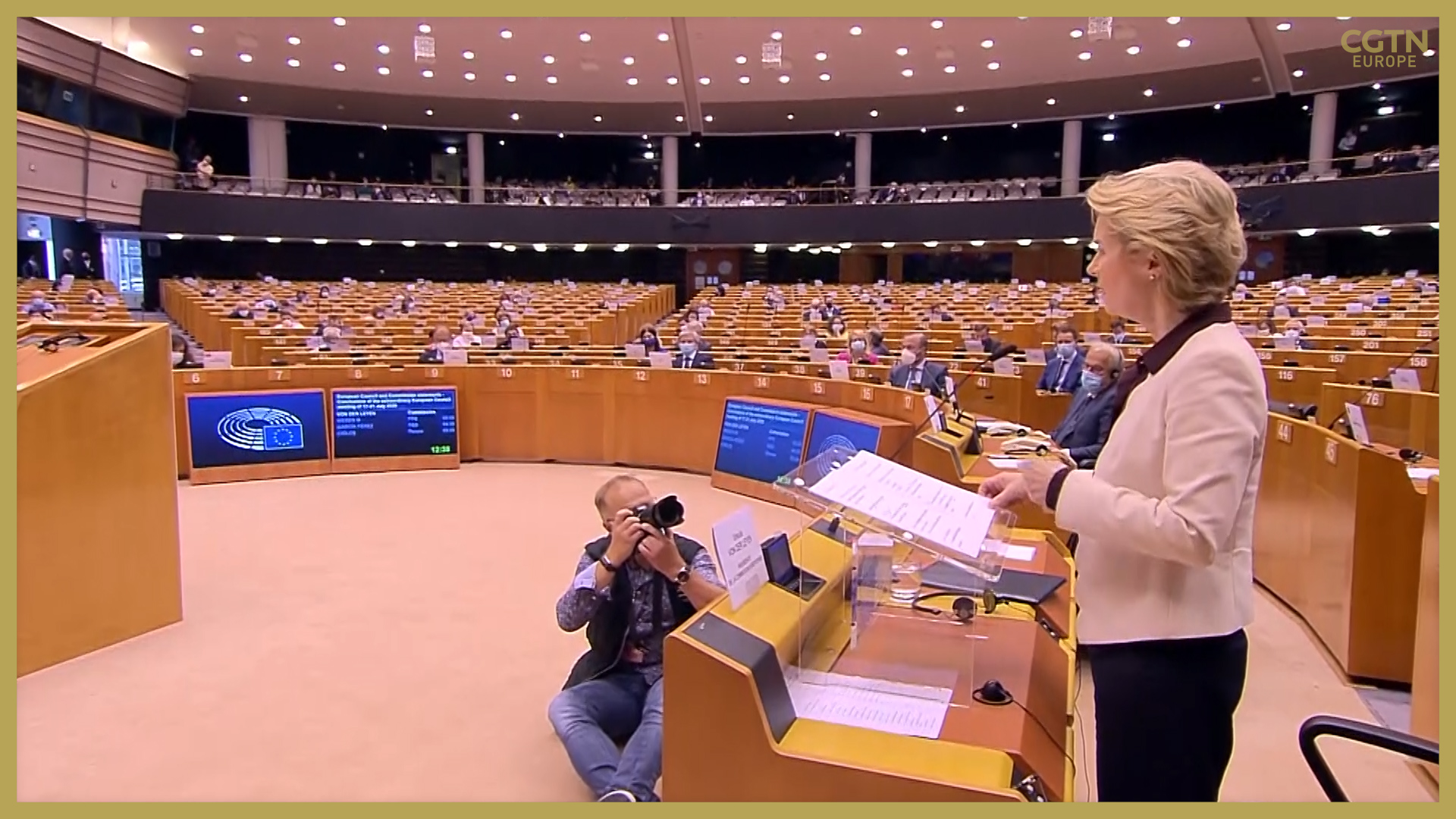02:45

The European Union's top official said Thursday that planned cuts in the next long-term multi-billion budget of the 27-nation bloc are a "difficult pill to swallow."
In a speech delivered to European lawmakers, European Commission President Ursula von der Leyen admitted that the budget deal for the next seven years adopted this week after a four-day EU leaders's summit features many inadequacies.
The 1.07 trillion-euro (1.2 trillion U.S. dollars) budget was negotiated in tandem with a 750 billion-euro (868 billion U.S. dollars) economic recovery package that aims to help EU countries bounce back from the recession caused by the coronavirus pandemic.
Hailed as a "historic" moment for Europe by many EU leaders, the deal has however raised concerns among European lawmakers, who slammed its lack of ambition in the context of the economic crisis triggered by the virus. The European Parliament has the final say in approving the budget. Members of the European Parliament have thrown down the gauntlet, threatening to block the next long-term budget if changes aren't made.
They outlined their demands to sign off on the 1.26 trillion U.S.dollars Multiannual Financial Framework (MFF) that EU leaders agreed to in the early hours of Tuesday morning.
"I am happy about the agreement, no doubt, but I'm not happy about the deal," said Manfred Weber, who leads the European People's Party, the biggest center-right parliamentary group.
It was a sentiment shared by many of his colleagues. MEPs from across parties backed a resolution saying they "do not accept" the terms of the deal.

Von der Leyen said the deal reached this week after a marathon summit was the "light at the end of the tunnel. But with light also comes shadow. And in this case, the shadow comes in the form of a very lean long term EU budget.”
"There are regrettable and painful decisions on many programs which have crucial European added values," said von der Leyen. She deplored the lack of funding for programs earmarked for research, health, and investment, as well as the limited size of the budget for programs outside the EU.
It was also unmistakable which parts of the deal MEPs want changed.
"At a time when the world is very concerned about a second wave of infection, European leaders have decided to drastically cut programs for research and public health," said Philippe Lamberts, the Greens leader. "How can we accept that?"
Iratxe Garcia Perez from the Progressive Alliance of Socialists and Democrats demanded, "not a single euro to a country that does not uphold the rule of law."
Dacian Ciolos, the Renew Europe chief, wanted to know how the bloc would pay for the $859 billion recovery fund.
"It simply wouldn't be serious to take up such a loan without knowing how we're going to pay it back," he said.

MEPs were willing to live with fewer grants in the recovery fund, but they're not willing to accept the long-term budget in its draft form. MEPs want the drastic cuts in proposed funding for health, climate and research initiatives reversed and questioned how Europe can stick to its goals of building resilience and climate neutrality with scaled-back funding.
Ursula von der Leyen, the president of the European Commission, who was on hand to drum up support for the deal, called the cuts "regrettable."
"We should always remember that the value of EU programs far outweigh their cost," she said. "Yes, we managed to avoid even further cuts as some member states wanted, but this MFF is a difficult pill to swallow."

From left, Ursula von der Leyen (president of the European Commission), Charles Michel (president of the European Council) and David Sassoli (president of the European Parliament) meet at the European Parliament for the opening exchanges to ratify the 2021-27 EU budget. /François Walschaerts/AFP
From left, Ursula von der Leyen (president of the European Commission), Charles Michel (president of the European Council) and David Sassoli (president of the European Parliament) meet at the European Parliament for the opening exchanges to ratify the 2021-27 EU budget. /François Walschaerts/AFP
Von der Leyen said the Commission will put forward a new package of taxes to help pay for the recovery fund. It will include a digital levy, a carbon border adjustment mechanism and an extension to the current emissions trading system.
As for linking funds to the rule of law, Von der Leyen didn't defend the current agreement, but vowed to push ahead with a 2018 proposal on the subject.
READ MORE: The EU's "historic" deal: Key questions answered
"Protecting our budget and the respect for the rule of law go hand-in-hand," she said.
Thursday's session wasn't an up-or-down vote on the deal, but rather the first step in what will be a months-long debate on what that final deal will look like. As the budgetary overlords, MEPs will have the last word on the long-term budget, so some changes can be expected. But not until after the summer break.
Check out our new six-part podcast series Notes on a Pandemic as CGTN Europe finds out how business, science and people have risen to the challenge of COVID-19.